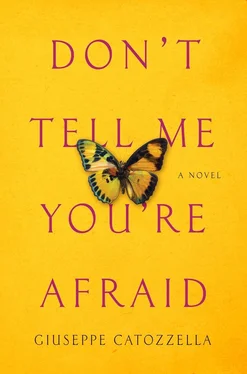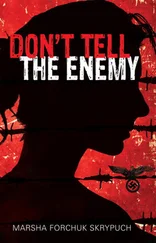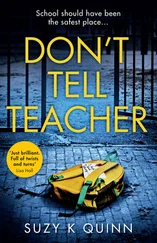
THE NEXT MORNING we ran the race.
The gathering place was at the national monument at eleven o’clock; the sun was almost at its peak and it was hot as hades.
The course wound through the streets of the city to the stadium: Once we entered it, we would run a lap around the field, then cross the finish line.
There were three hundred of us. For twelve months it was all I’d been waiting for: Week after week, day after day, I had mentally retraced every meter, every curve; I had imagined every moment of the race, picturing myself entering the stadium and at the finish.
Still, last night’s encounter with Ahmed, along with Alì’s mood, had had an effect on me too.
So I wasn’t able to give what I could have. I tried to keep to the edge of the group, I did everything I’d planned to do, but something inside me didn’t respond as I had expected. A part of my brain kept thinking about the glitter of those icy green eyes when they looked at Alì.
A year. I had spent a year training and I wasn’t able to give my best. I would never forgive myself.
The course was the usual one; Alì and I had run it a thousand times. The streets had been cleared of the few cars that normally traveled them and knots of vendors were gathered along the entire length of Jamaral Daud, selling water or refreshing juices, bananas and chocolate bars for a few shillings. With its trash cleared away, the avenue was unrecognizable.
Had it been any other day, I could have won.
But no. I came in eighth.
Alì finished one hundred and forty-ninth.
“You’re better at biting than running,” I teased him afterward. He had also ended up in a pool of excrement: an open sewer. Realizing that he was behind, he had cut through a side street where trash and feces were dumped at night, ever since a bomb had ruptured the sewer system built by the Italians. The cesspool that day had spread over the entire width of the street. Alì had thought it was shallow but found himself in it up to his calves. Still, he had gained a lot of ground.
At home that night we celebrated.
Hooyo cooked kebabs of lamb tripe and entrails, which I was crazy about. Kirisho mirish, a spicy meat and rice dish, along with sweet sesame paste, was my favorite. We were happy; Aabe told a lot of jokes and made us all laugh.
Alì, on the other hand, ashamed of the stench that stuck to him, didn’t even want to come out of his room. His brother Nassir had made him wash before going in, and afterward he refused to come out.
Every so often, when Said or Nassir called out, teasing him about the stink, Alì shouted something from the room, sniveling woefully. At that point we all chimed in.
“Leave me alone!” he yelled from his self-imposed isolation.
“Go on, come out and eat, Stinko!” Nassir kept at him, knowing he was making him even angrier.
“No, I’m never eating with you again,” Alì shouted.
“May a thousand pounds of sewage fall on your head,” Said piped up, and we all laughed uproariously. Alì didn’t answer.
Something was bothering him.
The fact that Ahmed was one of the fundamentalists’ militiamen had affected him deeply.
I’d told him that my brother Said was right not to trust Ahmed, but Alì had replied that Nassir was very close to Ahmed, so he couldn’t be bad.
Since that day, however, his eyes would suddenly cloud over with sadness now and then.
I’d try to make him laugh, but he would soon lapse back into his reflections.
I didn’t know what to do.
After that night, for several weeks he began to spend more and more time up in the eucalyptus. If we played griir, he got confused about the number of pebbles and lost; and he had always beaten all of us. When we played hide and seek, he always hid in the same places, and if someone pointed it out to him, he paid no attention. He didn’t care about winning.
He stayed up in his dumb eucalyptus, thinking about who knows what.
I didn’t recognize him anymore.
One afternoon, out of the blue, he told me that he was going to stop running and that he would become my coach.
“Why the heck should you be my coach?” I asked him as I laced up my shoes.
“You’re faster than me. It’s pointless for me to keep trying. I don’t have an aptitude for running; I have to face it. But you do.” He was nibbling an ear of corn that Hooyo had cooked the night before.
“And that’s why you’ve decided to be my coach?”
“Every athlete has a coach. If I can’t be an athlete, then I want to be a coach.”
“So if I win I’ll owe it all to you….” I teased.
“No,” he replied seriously, “it’s because you need someone to train you. You can’t do it alone.” A pause. I raised my head and looked at him.
“Can’t do what ?” I asked.
“You can’t become a champion.”
We were eight years old.
As usual, I didn’t answer him. But from that day on I had a coach.
I might have lost a playmate on account of Ahmed, though I didn’t want to admit it. But I had found myself.
After that day I turned into what I had always wanted to be: an athlete.
All thanks to Alì, without his even realizing it.
I hugged him tightly and we went out to run in the wind on that afternoon of boundless joy.

THEN, on a morning like any other, which gave no sign of what was about to happen, while Hodan and I were still asleep, Aabe went out as usual with Yassin to go to work in the Xamar Weyne district.
The area was a distance away but very busy, full of people coming and going, an ideal place to do business. Hundreds and hundreds of vendors hawked their products to passersby from large and small stalls in every color of the rainbow. This was the Xamar Weyne market, a raucous madhouse where the sellers were almost as numerous as the buyers. Cotton, linen, sweaters, charcoal, American jeans, shoes, fruit, sandals, vegetables, incense, spices, chocolate… Each one peddled his specialty.
Yassin was two years younger than Aabe and even taller, over six feet. He looked older, though: He had more wrinkles around his eyes and on his brow, and his eyes always seemed sad. Hooyo said it was because he had suffered so much over the loss of his wife, the beautiful Yasmin, Alì’s mother, who had died of cancer when we were two years old. There was a framed photograph of her on a dresser in their room, and every time I went in there I was taken aback by how beautiful Yasmin was. The broad forehead, the big, elongated eyes, the same full lips that Alì had.
Every morning Aabe and Yassin left the house at five and didn’t come home until around six in the evening, at sunset. They had two large stalls, Aabe’s for clothes and Yassin’s for vegetables.
“I hope you will never have to work as hard as I do, my little Samia,” Aabe, exhausted, always told me when I was little, before saying good night to me in the evening. I loved having him there close to me: Those moments were magical for me. I would lose myself in the scent of his aftershave and I was happy; I felt safe. Even his clothes had a smell. It was the smell of Aabe’s clothes after a long day’s work; I would have recognized it among thousands.
“If you can do it, so can I,” I told him.
“I’m doing it so that you won’t have to.”
“Aabe,” I said once after thinking about it for a while, “how come you never complain about what you do? Omar Sheikh, our landlord, is always complaining about everything. Whenever he’s here he spends all his time telling us about his hard luck.”
Читать дальше





![Ally Carter - [Gallagher Girls 01] I'd Tell You I Love You But Then I'd Have to Kill You](/books/262179/ally-carter-gallagher-girls-01-i-d-tell-you-i-lo-thumb.webp)







